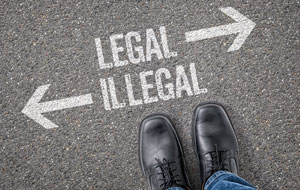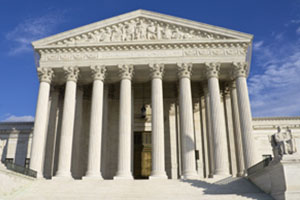Proof of Citizenship
The 14th Amendment to the U.S. Constitution stipulates that the right to vote in federal elections for the Senate, House of Representatives and presidency is limited to U.S. citizens.
With few exceptions, most state constitutions explicitly authorize only resident citizens to vote in state and local elections.
Currently, there is no state or national database or system to verify the citizenship of voters. Many states utilize self-reported citizenship information from non-citizen residents, but some use the national Systematic Alien Verification for Entitlements Program database at the Department of Homeland Security to assist in verifying citizenship status. Several states attempting to prevent non-citizen voting have enacted laws requiring proof of U.S. citizenship of registrants when registering to vote.
Our current honor system on the part of registrants under the National Voter Registration Act of 1993 includes a provision that created a federal voter registration form that requires applicants under penalty of perjury to check a “yes” or “no” box as to whether they are U.S. citizens. However, the federal form does not require any proof of citizenship, and its use has been shown to be ineffective in deterring non-citizens from registering to vote.
This issue has been hotly contested in the courts with advocates for this sensible safeguard against fraudulent voter registration up against a solid flank of left-wing groups such as Common Cause, Project Vote, the League of Women Voters and the American Civil Liberties Union.
In April 2015, the ACRU filed an amicus brief in Kobach v. United States Election Assistance Commission at the U.S. Supreme Court that included evidence that non-citizens in Texas were registering to vote using the federal form. On June 29, 2015, the Supreme Court denied Kansas’s and Arizona’s writ of certiorari petition, thus letting stand a 10th Circuit ruling that the states may not require applicants using the federal voter registration form to show documents proving citizenship when registering to vote in federal races.
ACRU Commentary
Trump’s Commission Will Root Out Voter Fraud, and Here’s How
The solution’s simple: citizenship-verification as a prerequisite for voter registration.
While the Left Ignores Voter Fraud, More Evidence Mounts to Prove Them Wrong
So far, Heritage has documented 773 confirmed criminal convictions in 492 voter fraud cases spanning 44 states.
How Liberal Professors Are Blackballing Studies Confirming Trump’s Claim of Voter Fraud
"...we believe it should not be cited or used in any debate over fraudulent voting.”
Election Fraud Must Be Stopped
How could anyone oppose the practice of showing a photo identification to ensure that you’re you?
It’s Time for only Citizens to Vote in Texas
By J. Christian Adams The voter fraud conviction of Texas resident and Mexican national Rosa Maria Ortega should make it clear we need citizenship verification in voter registration. Over and over, Austin considers bills that [...]
Election Integrity Can’t Wait
Voting by noncitizens is easy if they’re not required to prove citizenship when registering or a photo ID when voting.
News
SCOTUS Ready to Deliver Five Major Decisions
5/13: The Supreme Court is set to make landmark decisions, including regulating gerrymandering and deciding whether a citizenship question should appear on the 2020 census.
Maine Lawmakers Debate Proof of Citizenship Law
5/11: Maine lawmakers are debating a constitutional amendment that would keep noncitizens from voting.
Most Americans Support a Citizenship Question on the 2020 Census
5/2: A Hill-HarrisX survey found that the majority of registered voters, including 53% of Hispanic voters, believed a citizenship question should be on the 2020 Census.
SCOTUS Seemed to Agree with Trump in Census Oral Arguments
4/23: When the Supreme Court heard oral arguments over the constitutionality of a citizenship question in the 2020 census, the justices seemed to agree with the President's position.
Citizenship Question Vital to Census Accuracy
4/23: The question about citizenship is a vital part of keeping the 2020 census accurate.
District Court Judge Rules Census Question Unconstitutional
4/5: U.S. District Judge George Hazel ruled that including a citizenship question in the 2020 census would be unconstitutional.











